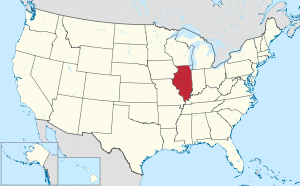Mason County, Illinois
Mason County | |
|---|---|
 Location within the U.S. state of Illinois | |
 Illinois's location within the U.S. | |
| Coordinates: 40°14′N 89°55′W / 40.24°N 89.91°W | |
| Country | |
| State | |
| Founded | 1841 |
| Seat | Havana |
| Largest city | Havana |
| Population (2000) | |
• Total | 16,038 |
| Time zone | UTC−6 (Central) |
| • Summer (DST) | UTC−5 (CDT) |
| Website | www |
Mason County is a county located in the U.S. state of Illinois. As of 2000, the population was 16,038. Its county seat is Havana, Illinois6. The County is named in honor of George Mason, a member of the Virginia legislature who campaigned for the adoption of the United States Bill of Rights.
Geography
According to the U.S. Census Bureau, the county has a total area of 1,459 km² (563 mi²). 1,396 km² (539 mi²) of it is land and 63 km² (24 mi²) of it (4.34%) is water.
Mason County is bounded on the south by the Sangamon River, and on the west by the Illinois River. These rivers join at the southwest tip of the County.
The soil covering much of Mason County is very sandy. This was formed during the melting of the Wisconsin Glacier about 10,000 years before present. Meltwater from the glacier deposited large amounts of sand in a delta region near at the junction of the Sangamon and Illinois Rivers.
The sandy soil does not hold water well, quickly exposing crops to drought conditions as the water table drops during dry weather. The soil is, however, very good for growing vegetables that are otherwise not common in Illinois. Modern irrigation has made this a highly productive agricultural area.
A sand wetland on the Illinois River is managed by the U.S. Fish and Wildlife Service as the Chautauqua National Wildlife Refuge.
Adjacent Counties
- Fulton County - north
- Tazewell County - northeast
- Logan County - southeast
- Menard County - south
- Cass County - southwest
- Schuyler County - west
Demographics
| Census | Pop. | Note | %± |
|---|---|---|---|
| 1900 | 17,491 | — | |
| 1910 | 17,377 | −0.7% | |
| 1920 | 16,634 | −4.3% | |
| 1930 | 15,115 | −9.1% | |
| 1940 | 15,358 | 1.6% | |
| 1950 | 15,326 | −0.2% | |
| 1960 | 15,193 | −0.9% | |
| 1970 | 16,161 | 6.4% | |
| 1980 | 19,492 | 20.6% | |
| 1990 | 16,269 | −16.5% | |
| 2000 | 16,038 | −1.4% | |
| IL Counties 1900-1990 | |||
As of the census2 of 2000, there were 16,038 people, 6,389 households, and 4,561 families residing in the county. The population density was 11/km² (30/mi²). There were 7,033 housing units at an average density of 5/km² (13/mi²). The racial makeup of the county was 98.82% White, 0.12% Black or African American, 0.26% Native American, 0.21% Asian, 0.09% from other races, and 0.50% from two or more races. 0.50% of the population were Hispanic or Latino of any race.
There were 6,389 households out of which 30.50% had children under the age of 18 living with them, 58.40% were married couples living together, 9.00% had a female householder with no husband present, and 28.60% were non-families. 24.90% of all households were made up of individuals and 13.00% had someone living alone who was 65 years of age or older. The average household size was 2.48 and the average family size was 2.93.
In the county the population was spread out with 24.40% under the age of 18, 7.70% from 18 to 24, 26.30% from 25 to 44, 24.20% from 45 to 64, and 17.30% who were 65 years of age or older. The median age was 40 years. For every 100 females there were 96.10 males. For every 100 females age 18 and over, there were 93.10 males.
The median income for a household in the county was $35,985, and the median income for a family was $42,239. Males had a median income of $33,426 versus $21,093 for females. The per capita income for the county was $17,357. About 7.80% of families and 9.70% of the population were below the poverty line, including 13.60% of those under age 18 and 9.60% of those age 65 or over.

